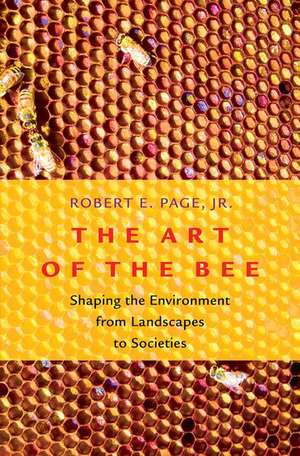The Art of the Bee: Shaping the Environment from Landscapes to Societies
Autor Robert E. Pageen Limba Engleză Hardback – 17 sep 2020
Preț: 221.07 lei
Preț vechi: 255.27 lei
-13% Nou
Puncte Express: 332
Preț estimativ în valută:
42.31€ • 45.94$ • 35.54£
42.31€ • 45.94$ • 35.54£
Carte disponibilă
Livrare economică 21-27 martie
Preluare comenzi: 021 569.72.76
Specificații
ISBN-13: 9780197504147
ISBN-10: 0197504140
Pagini: 256
Dimensiuni: 163 x 236 x 20 mm
Greutate: 0.5 kg
Editura: Oxford University Press
Colecția OUP USA
Locul publicării:New York, United States
ISBN-10: 0197504140
Pagini: 256
Dimensiuni: 163 x 236 x 20 mm
Greutate: 0.5 kg
Editura: Oxford University Press
Colecția OUP USA
Locul publicării:New York, United States
Recenzii
[I] recommend this wonderful volume unreservedly to students of bee biology, naturalists, gardeners, and anyone with a desire to know more about the fascinating world of honey bees.
Bees as artists or engineers? With deft use of metaphor, Page, one of our most eminent honey bee biologists, skillfully offers readers a down home, yet lyrical, romp through some of the most important topics in contemporary bee biology. But don't be fooled by the amiable and personal style--the book is comprehensive--from colony collapse disorder to colony-level evolution--and chock full of the latest results, presented with clarity and depth, leavened with razor-sharp insights into social evolution.
This wonderful book contains all the information expected from a textbook on honeybee biology, but beyond textbook style, Page presents this information in a series of sparkling essays built around particular views--e.g., honeybees as environmental painters and engineers--that read like mystery stories. With these lucidly written stories Page takes us on a delightful journey through the many biological traits that on the whole constitute the honeybees' social contract.
Drawing from his distinguished career studying honey bees, Robert Page reflects on the adaptations of social organisms that yield contracts through which their societies function through both harmony and discord. His journey into the hive, like Alexander von Humboldt's global explorations two centuries ago, stimulates and inspires us to ponder our own place in nature and within our human societies.
Bees as artists or engineers? With deft use of metaphor, Page, one of our most eminent honey bee biologists, skillfully offers readers a down home, yet lyrical, romp through some of the most important topics in contemporary bee biology. But don't be fooled by the amiable and personal style--the book is comprehensive--from colony collapse disorder to colony-level evolution--and chock full of the latest results, presented with clarity and depth, leavened with razor-sharp insights into social evolution.
This wonderful book contains all the information expected from a textbook on honeybee biology, but beyond textbook style, Page presents this information in a series of sparkling essays built around particular views--e.g., honeybees as environmental painters and engineers--that read like mystery stories. With these lucidly written stories Page takes us on a delightful journey through the many biological traits that on the whole constitute the honeybees' social contract.
Drawing from his distinguished career studying honey bees, Robert Page reflects on the adaptations of social organisms that yield contracts through which their societies function through both harmony and discord. His journey into the hive, like Alexander von Humboldt's global explorations two centuries ago, stimulates and inspires us to ponder our own place in nature and within our human societies.
Notă biografică
Robert E. Page, Jr., is Regents Professor Emeritus at Arizona State University and Professor Emeritus at the University of California, Davis. He has published more than 230 research papers and articles and authored two other books, The Spirit of the Hive (Harvard University Press, 2013) and Queen Rearing and Bee Breeding, with Harry H. Laidlaw (Wicwas Press, 1997). In 2009, he was a Fellow of the Wissenschaftskolleg of Berlin. In 2009, he was a Fellow of Wissenschaftskolleg of Berlin. Page is an elected member of the American Academy of Arts and Sciences, the Brazilian Academy of Science, Leopoldina (the German National Academyof Science), and the California Academy of Science. He is a recipient of the Alexander von Humboldt Senior Scientist Award (Humboldt Prize, 1995), the Carl Friedrich von Siemens Fellowship (2018), James W. Creasman Award of Excellence at ASU (2018), and the Distinguished Emeritus Award at UCD (2019).
